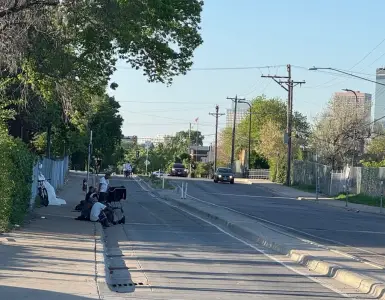Hennepin County homelessness is down compared with national numbers, but there’s a catch

Homelessness is continuing to decrease in Hennepin County at a rate that defies national trends but the funding originally used to help make this decrease happen expired in December Hennepin County is unique in comparison to the greater part other jurisdictions across the country and state because it invested almost of its pandemic recovery funds into homelessness prevention The effort was critical in helping the county address homelessness in the years following a record high David Hewitt director of housing stability reported MinnPost Now the county is facing a new challenge American Rescue Plan funds used to build out a robust homelessness prevention initiative expired in December resulting in a fiscal cliff As a temporary Band-Aid the Hennepin County Board budgeted for an additional year of funding There s a catch to the county choosing to shoulder this expense It was a decision that came with the commitment to take on an estimated million deficit This means the county s homelessness response club has one year of needed funding for its first-in-the-country undertaking which was recognized last year in a documentary by national nonprofit Invisible People before an alternative must be detected This funding is not going to come from the state The county already tried to go to state lawmakers to pass further initiative to fund the project and failed to get a majority of buy-in Hewitt stated While not getting more state funding is disappointing and certainly contributes to a challenging atmosphere we have no desire to go backwards he added Now Hewitt s department is looking to its partners to help find a sustainable explanation but details of what that could look like are still unclear A closer look at Hennepin County The responsibility to do homelessness response work falls on no one entity at least not legally Hewitt stated That s what makes finding sustainable funding for this kind of work complicated It s a choice rather than an obligation If anybody says it s the county s job or it s the city s job or it s the state s job technically it is not anybody s job from the lens of who has statutory responsibility Hewitt noted Hennepin County has as a board direction made the choice to step into and invest in this area of work The numbers the county s funding have produced speak for themselves Hewitt added During its Point in Time PIT count a federally mandated count of sheltered and unsheltered people experiencing homelessness conducted nationwide Hennepin County revealed people staying in shelters and transitional housing programs and people experiencing unsheltered homelessness Those are and decreases respectively since The number of people experiencing unsheltered homelessness was at its peak during the PIT count when workers counted people sleeping in unsheltered settings according to the county description The count proved a decrease in unsheltered homelessness year-over-year and a decrease since While Hennepin County has already published its PIT count findings for not all jurisdictions have done so yet The final description compiling all counts across the country will be published at the end of the year But looking back at nationally the rate of unsheltered homelessness was about in people Hewitt announced In Hennepin County however the rate of homelessness was about in people less than half the national average Comparable metros like Portland Seattle and Denver have seen the opposite shift occur In Portland s Multnomah County which has already disclosed its PIT count numbers the estimated homeless population in per the PIT was a increase from the counted in In Seattle s King County and Denver s Denver County sheltered and unsheltered homelessness has been released to be at record highs The difference between the Hennepin County numbers and those seen in other jurisdictions comes down to outlay Hewitt noted Over the past five years millions of county dollars through the American Rescue Plan have been spent on things like preventing evictions providing event management work and preservation of affordable housing For example in alone the county awarded million to create or preserve units of affordable housing with of those units affordable to people with incomes at or less of the area median income The county also provided crisis rental assistance to more than households with fewer than of those households entering homelessness This required stake in occurrence workers and social workers Now nearly people work on the homelessness and housing stability crew Though the long-term sustainability of this initiatives is unclear Hewitt emphasized that he believes every penny was worth it We invested in this on the basis that we believe that it would be the greater part impactful thing to do and the right thing to do while we were able to invest he explained We supposed that it would show its value in a way that would allow us to make the affair for continued venture at the state and now in other spaces An eye on Minneapolis homelessness A scant months back Minneapolis Mayor Jacob Frey touted drastically lowered city numbers of unhoused people within city limits More specifically the mayor was talking about encampments which have been targeted for more aggressive police disbandment since a January special order issued by Police Chief Brian O Hara empowered officers to break them up From the onset of the January order to March police prevented at least encampments from forming due to the order according to a Minneapolis Police Department news release Frey recounted media outlets in March that the number of people in homeless encampments in the city was down to from nearly in the fall The mayor has commented this reduction of unhoused people sleeping outside is the consequence of the city s continued practice of emerging up large encampments along with ramping up outreach to unhoused But in April the Minnesota Star Tribune followed up on the mayor s review noting that while a multitude of unhoused people became less visible over a short period of time countless are still on the streets but now out of sight This is where it becomes central to understand the methodology used to collect numbers when looking at the broader picture of area homelessness A look at both PIT count content and the city s numbers as well as the differences in methodology used to collect the statistics paints a more robust picture of what s going on The statistics the mayor referred to is not collected in the same way as PIT count figures From day-to-day the city is collecting numbers based on calls reporting people experiencing unsheltered homelessness the majority visible of whom are in encampments These numbers are more city-specific than the PIT which covers the entirety of Hennepin County not just Minneapolis But the PIT count also uses a far more robust process to find people experiencing unsheltered homelessness beyond what can be collected solely from calls It includes a count of people sleeping in vehicles people sleeping on transit people who are walking all night without sleeping at all and people who may be staying in very secluded and hard to access and hard to see areas Hewitt explained It s far easier to count sheltered homelessness than unsheltered Hewitt explained The difficulty lies in visibility Source Minneapolis Homeless Response Unit dashboard In a message to MinnPost Enrique Velazquez director of regulatory services for the city of Minneapolis explained the latest PIT count numbers reinforce what we ve seen on the ground that the human-centered approach Minneapolis and Hennepin County are taking to help individuals exit unsheltered homelessness is working The city is not only current up camps Velazquez wrote The city of Minneapolis has made essential progress in preventing encampments from forming and connecting individuals to shelter and housing The post Hennepin County homelessness is down compared with national numbers but there s a catch appeared first on MinnPost


